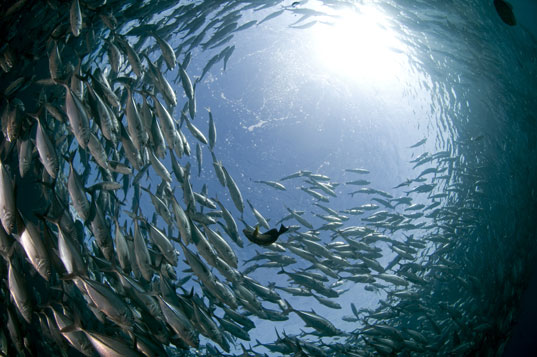by CJ Verburg
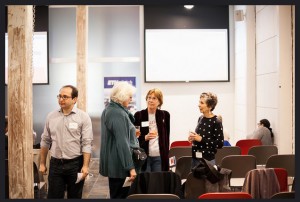
Last week, two friends & I met at the intersection of Switzerland and San Francisco for a mind-boggling look into the future.
Swissnex is Switzerland’s HQ for high-tech liaisons with the Bay Area and Silicon Valley, and it’s just up Montgomery Street from the Transamerica Pyramid. On Friday night, April 8, we’re here to learn about investigative projects in which scientists based at ETH Zurich (“Where Einstein launched his career”) are directing research teams of hundreds, thousands, or millions of ordinary citizens around the world.
That unassuming man in geeky glasses and rolled-up shirtsleeves is Kevin Schawinski, Professor of Galaxy & Black Hole Astrophysics at ETH Zurich. A winner of the Royal Astronomical Society’s thesis prize at Oxford and a NASA Einstein Fellowship at Yale, he also cofounded the Galaxy Zoo. As his colleague Lucy Fortson will explain shortly, galaxies fall into two basic groups: blue spiral, which are relatively young and still forming stars, and red elliptical, AKA “red and dead.”
In this age of Big Data, projects such as the Sloan Digital Sky Survey can provide scientists with more information than any one person, university, or even nation can process. After classifying 50,000 galaxies himself, Schawinski turned over the other 950,000 in the pipeline to sharp-eyed online observers. “Within 24 hours of launch we were stunned to be receiving almost 70,000 classifications an hour.” That’s the Galaxy Zoo. If it sounds like fun, you can click here and start classifying galaxies yourself right now.
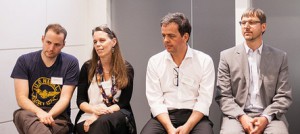
First speaker on the panel is Professor of Computational Social Sciences Dirk Helbing, whose specialties include crowds and traffic. He gives us a whirlwind tour of Big Data issues and responses, starting with the paradox that as information proliferates, the percentage we can process drops: What we CAN know may actually decrease what we DO know. We do know that governments and corporations are voraciously collecting data on individuals. In China, “citizen scores” on a multitude of measures are already becoming the basis for what each citizen is allowed to do. Helbing coordinates the FuturICT Initiative, which uses smart data to understand techno-socio-economic systems. His project Nervousnet is “a decentralized Internet of Things platform for privacy-preserving social sensing services.” Provided as a public good, it’s a two-way open-source mobile app. Nervousnet is holding its first Hackathon this weekend — check it out.
Dr. Ulrich Genick moved from biochemistry in Berlin to structural biology and biophysics at Scripps, the Salk Institute, and Brandeis, to leading a large-scale study on the interplay of human genetics, metabolism, and taste perception at the NRC in Lausanne. Now he’s at ETH Zurich’s Institute of Molecular Systems Biology, where last year he cofounded the MIDATA health data cooperative. Its intent is to restore control of personal data (health data in particular) to the sources of that data. Instead of signing over your privacy rights to any service that demands them as a condition of access, you’d be able to retain secure ownership of your own data and license its use. Genick explains why his current research focuses on taste and smell: the genetic specificity and wide individual variation of those senses (single nucleotide polymorphism) makes them ideal for investigating the relationship between genotype (your specific genetic sequence) and phenotype (how you experience, say, a cup of coffee). The more participants who supply their DNA analysis and their sensory perceptions, the more accurate a portrait can be created of which nucleotides play what role in the genetics of taste and smell.
Genick explains why his current research focuses on taste and smell: the genetic specificity and wide individual variation of those senses (single nucleotide polymorphism) makes them ideal for investigating the relationship between genotype (your specific genetic sequence) and phenotype (how you experience, say, a cup of coffee). The more participants who supply their DNA analysis and their sensory perceptions, the more accurate a portrait can be created of which nucleotides play what role in the genetics of taste and smell.
Widening our view from nucleotides to galaxies is Professor Lucy Fortson, a founding member of the Zooniverse project and current board chair for the Citizen Science Alliance. In her vision of the emerging future of scientific research, human beings operate as a single multicellular investigator, eerily parallel to the multistellar galaxies they’re classifying. 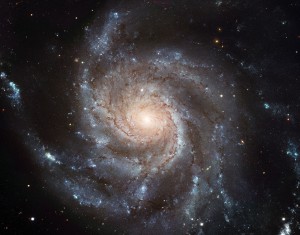 Fortson’s own sleuthing took her from high-energy physics at the CERN particle accelerator in Geneva to cosmic ray and gamma ray astrophysics with the Chicago Air Shower Array at the University of Chicago; currently she’s at the University of Minnesota. She recalls her and Kevin Schawinski’s happy surprise at the Galaxy Zoo’s success, which encouraged its proponents to add a few more projects, then many more. Now it’s morphed into the Zooniverse, a worldwide online platform which invites volunteers everywhere to collaborate on research projects from astronomy to zoology.
Fortson’s own sleuthing took her from high-energy physics at the CERN particle accelerator in Geneva to cosmic ray and gamma ray astrophysics with the Chicago Air Shower Array at the University of Chicago; currently she’s at the University of Minnesota. She recalls her and Kevin Schawinski’s happy surprise at the Galaxy Zoo’s success, which encouraged its proponents to add a few more projects, then many more. Now it’s morphed into the Zooniverse, a worldwide online platform which invites volunteers everywhere to collaborate on research projects from astronomy to zoology.
Dr. Adrien Treuille, V.P. of Simulation at Zoox, came to this driverless-car startup from Google X; before that, he taught computer science and robotics at Carnegie Mellon. He zooms us back down to micro level as the creator of the online games Foldit and Eterna. 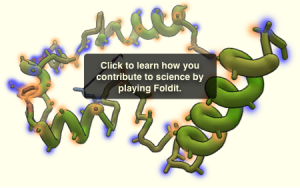 In challenging players to compete at folding proteins and designing RNA, these games (like the Zooniverse and other projects discussed here tonight) also establish a collaboration among far-flung strangers. On a personal level, they awaken creativity and skills that participants never knew they had. On a scientific level, they focus a myriad of sharp eyes and minds on problems that are too vast and/or complicated for any ordinary pod of humans (or computers) to solve.
In challenging players to compete at folding proteins and designing RNA, these games (like the Zooniverse and other projects discussed here tonight) also establish a collaboration among far-flung strangers. On a personal level, they awaken creativity and skills that participants never knew they had. On a scientific level, they focus a myriad of sharp eyes and minds on problems that are too vast and/or complicated for any ordinary pod of humans (or computers) to solve.
Along with the parallels among citizen-science projects, Lucy Fortson notes a contrast. For her research, she seeks as many participants as possible — the more people, the better the data. For his, Adrien Treuille seeks the most skillful participants. His games encourage self-selection: if you don’t win more points than the other players figuring out how to fold a protein from its amino-acid sequence, you’ll soon quit. Ulrich Genick takes a more traditional approach in his sensory research by recruiting a specific number of volunteers to study in a specific place. Similarly, for Dirk Helbing, a crowd of participants are his subject as well as his collaborators.
Emerging from this heady gathering, I find myself mulling over two common themes. One is the shift in scientific research from direct observation of physical subjects to designing experiments with and for computers. Do astronomy or botany students still choose the field from an attraction to planets or plants, or is the aptest motivation nowadays a desire to count and track? The other thread is the remarkable way the Internet age is bringing out the collective tendencies of human beings. We’re gravitating toward our ant-colony or school-of-fish side: diverse minds finding not just a common purpose but a common direction and rhythm. This is not new, but it’s a 180-degree-turn from my generation’s passionate commitment to individual self-discovery and self-expression.
I’ve been wondering for decades how the Net — freeing human connections from geography and even time — would change the concept of community. Maybe one answer is Citizen Science.

